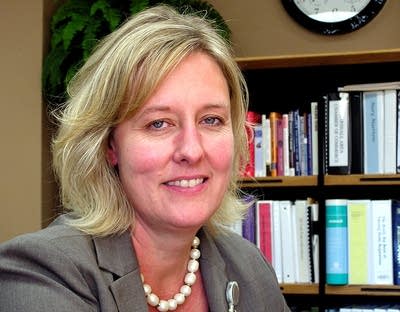Changes to health care bring added stress to hospital administrators
Go Deeper.
Create an account or log in to save stories.
Like this?
Thanks for liking this story! We have added it to a list of your favorite stories.

Some hospital administrators in Minnesota say health care reform's looming changes are causing some sleepless nights.
Imagine trying to run a business where lives are at stake, costs are rising, and revenues aren't keeping up -- all in the middle of a severe recession. Then, Congress changes the rules you've worked by for decades but hasn't spelled out what those new regulations will look like.
Tim Rice runs Lakewood Health System, a small hospital in Staples, Minn. with 25 beds. He said health reform was like a big rock perched on a cliff. People talked about it for decades but Congress never pushed the rock over the edge -- until now.
"The difference between now and past efforts is that if you don't move the rock is going to crush you."
"The change is coming. So you need to be thinking about how you are going to adapt for what is coming," Rice said. "The difference between now and past efforts is that if you don't move the rock is going to crush you."
Turn Up Your Support
MPR News helps you turn down the noise and build shared understanding. Turn up your support for this public resource and keep trusted journalism accessible to all.
Rice said the rock coming down on his hospital is a financial one, as health reform provides more people with insurance and changes how providers get paid.
Rice said he thinks that his hospital will have more demand but are going to be receiving less money. Rice said they're just going to have to figure out how to do that.
"The experts in the industry have said we will experience more change in this decade than we did from the advent of Medicare in 1965 to 2010," said Mary Maertens, Regional President of Avera Marshall Medical Center in Marshall. She runs an organization that includes a 25-bed hospital, 76-bed long-term nursing center, specialty clinics, and an outpatient center.
Maertens is trying to figure out a reform law that has a change in the payment system at its heart, but who gets paid for what is still up in the air.
"The more instability in the system, then the (more) additional stress in the system," Maertens said. "I think there's a lot to be learned yet within health care as to how we will actually be paid, although that's becoming more and more clear as each day moves forward. The system has yet to organize itself."
That uncertainty is less troubling for large health organizations like Essentia Health Systems based in Duluth. Essentia is the result of several mergers over the past 13 years, beginning with St. Mary's and the Duluth Clinic in 1997. Since then, it's grown to 17 hospitals, 62 clinics and operates in four states.
Essentia CEO Peter Person said the reform law was essentially written for the big health care systems like his that have cut costs while improving the quality of care. But Person said his biggest frustration right now is what he calls the political noise about repealing reform, and it's only causing greater uncertainty.

"There seems to be, at least this time of year with election coming up in November, some anti-health care reform sentiment in maybe we should roll back some of the changes that we had made," Person said. "We hope the people in Washington and St. Paul see the big picture and are more interested in moving forward were some of the big systems are in this state."
Despite the stress, Tim Rice of Lakewood Health Systems said he's optimistic about the opportunities reform will bring, particularly expanding coverage to 32 million more Americans. He said the hospital sees patients without insurance every day.
But just as troubling, is a recent spike in the number of patients who do have insurance but can't afford the care they need because of high deductibles or co-pays. Rice said people who survived cancer aren't coming back for check-ups.
"We're having more and more people saying, 'you know what, I think I'll just wait.' Well we never heard that before," Rice said. "But just think about it -- people are stating because of financial reasons I'm willing to take that risk and not have a follow up colonoscopy, when that could be potentially cancerous with a past history."
All three hospital administrators agree on at least one issue, the current system, with its soaring costs, was unsustainable.




